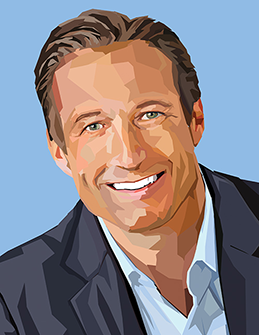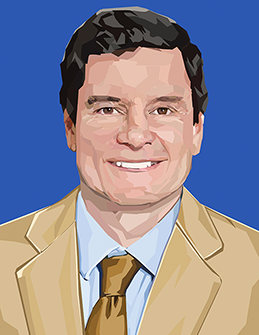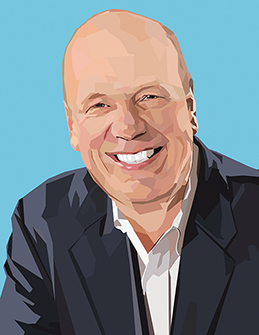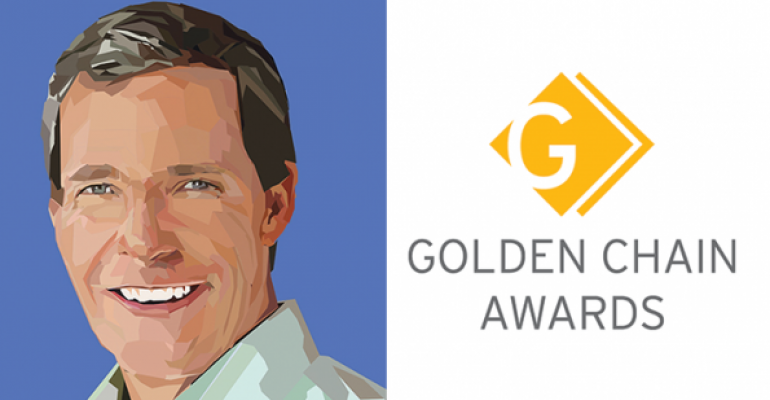
Greg Flynn is founder, chairman and CEO of Flynn Restaurant Group LP, the nation’s largest restaurant franchise company. Operating more than 850 restaurants under Applebee’s, Taco Bell and Panera Bread, the group books about $1.9 billion in annual revenue, and employs about 42,000 people in 29 states. An entrepreneur since the age of 10, and a Brown, Yale and Stanford educated man, Flynn says he’s not done. Flynn sat down with former Golden Chain winner Julia Stewart, chairman and CEO of DineEquity Inc., franchisor to the Applebee’s chain.
Julia Stewart: Something I’ve actually had people ask me about you … ‘So when Greg was growing up, when he was young, was there a trigger?’ What turned on that entrepreneurial spirit in you, that drive?
Greg Flynn: So, I’ve had little businesses since I can remember; a whole bunch of them. My very first serious business was a fruit business [when Flynn was 10 years old], where I would take the bus into the wholesale fruit market in San Francisco and buy cases of plums, and sometimes artichokes and apples, and take the bus back to the little town where I grew up, in Ross, [Calif.,] and I had a wagon waiting for me at the bus stop, and I would go door to door and sell fruit to housewives who would buy them not so much because they needed it, but because a kid showed up with a wagon. And I made very good money doing that. …
I’ve had so many little businesses that [my drive] started very early, and it’s been consistent throughout my career.
JS: Who has inspired you or mentored you in your career, and what special insights did they give you?
GF: I think my greatest mentor and inspiration was my uncle, Andrew Clarkson, and Andrew was … born in Scotland, Oxford educated, ultimately went to Harvard Business School … He lived his life by the maxim ‘learn, earn and return,’ and he didn’t make that up, but it’s what guided his life, and frankly, it’s come to be what guides my life.
The first third of my life was learning until age 30, and I did it with gusto. I’m solidly in the ‘earn’ phase right now, and I’m having a great time doing that. But the back third, hopefully it’s another 30 years in the back, will be about returning, and my wife and I are fully committed to giving it all away while we’re still alive.




JS: Wow. What a great answer, and something for a lot of us to aspire to. What are the top three challenges you think restaurants face in the next year?
GF: Well, the top three in order are labor, labor and labor. It’s astounding how quickly the minimum wage, and therefore sort of all wage rates, is rising across the country. And I sit in San Francisco, which of course is in California, both of which have now adopted a $15 minimum wage. There is movement to go up scores of percentages in the minimum wage everywhere in the country right now, and it’s going to be very disruptive and very transformative, and poses our biggest challenge. And we’re going to have to figure out how to evolve our restaurant model in a new high-labor cost environment. I have no doubt it will require us to be more efficient with our labor, probably to consider technology, which makes us more efficient, and it probably will make us need to be more competitive because not everyone is going to be able to survive.
JS: What are you optimistic about?
GF: I am optimistic about a lot of things. I am delighted that we are in a business which is essentially about people. It’s about motivating and training people to serve other people, and it’s what I love and I think what we as a team are really good at. And I’m optimistic that demand for that is not going to go away, that can’t be “Amazon-ed” away. We deliver fresh food and experiences, and as long as we can do it as well or better than the other guy, I think we will have a job for life.
How tech will shape the industry

JS: How do you think technology will shape the restaurant industry going forward?
GF: I do think it will depend on the category you’re looking at, but I think everywhere it’s going to become increasingly more important and more focused on by operators in all segments as labor costs rise. In quick service, honestly, the whole thing may get nearly entirely automated. And full service, our servers probably will never go away, but they will probably be assisted by technology to be more efficient and more effective at what they do. …
I also think that there are technologies which are just supremely convenient for our guests, and an example would be rapid pickup/delivery using mobile ordering at Panera, for instance. …
Now in the context of Applebee’s, of course we will always be committed, I believe, to a sit-down dining experience with liquor, and so [that experience is] not going to be supplanted in any way by technology, just enhanced. So, you’re not going to wait to pay your bills anymore; you’re not going to wait to find a server to get that second drink.
JS: You’re the largest franchise operator in the country: You have three brands, and sales in the billions. Tell me about how you structure your portfolio to make sure your restaurants are executing consistently.
GF: We have a unique operating model that is relatively decentralized, and we think of it as a state and federal model, where states are markets or clusters of restaurants run by state governors — we call them market presidents — who are empowered to run their markets with a fair bit of customization, with sensitivity to the local peculiarities of their guests, or their competitors, or their cuisines, of course within the confines of being part of a brand. … The reason is we believe that locally owned operators can execute better for the most part.
But there are true scale economies in the business, and being part of a national group gives you a big advantage. So everything like IT and HR and purchasing and training and real estate, finance, admin, accounting — all of that is better taken out of the restaurants and done with a first-class staff at the national level. That’s the sort of federal part we think of, but it’s all in service of the individual entrepreneurs who are running our markets. …
And I think underlying the entire philosophy is our central trust in people. Over and over again, we’ve learned that there are great people in the restaurant industry, and people are generally capable of delivering better results than they are currently delivering, or than anyone has ever asked them to deliver, and by painting a picture of a better outcome for them and empowering them with the authority and with the tools and the financial resources to do what they know to be best in their markets, they do deliver better results, and what we need to do is align our interests, give them the tools, and get out of the way.
 Julia Stewart, chairman and CEO of DineEquity Inc., was named a Golden Chain Award winner and Operator of the Year in 2015.
Julia Stewart, chairman and CEO of DineEquity Inc., was named a Golden Chain Award winner and Operator of the Year in 2015.

